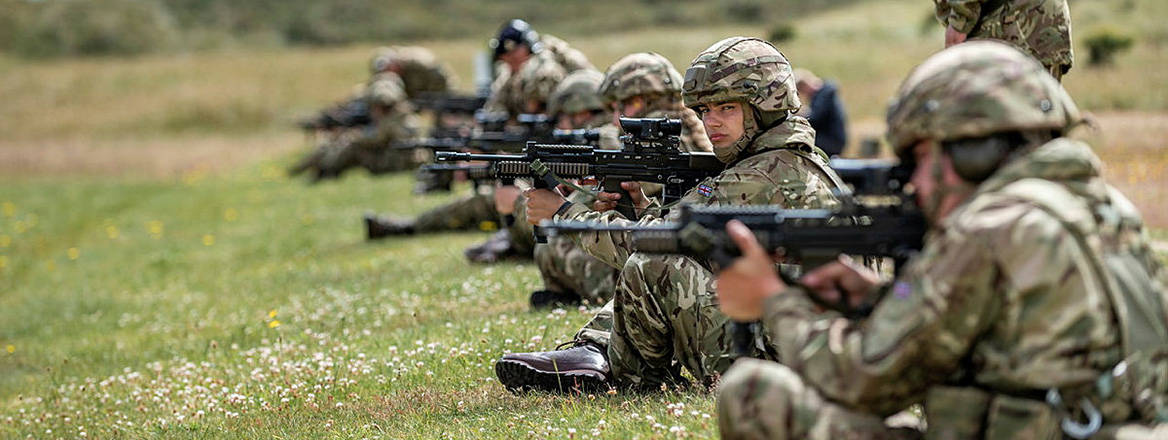Without a Strong Volunteer Reserve, the UK Military Cannot Hope to Compete
The UK must embrace reserve forces to build affordable military mass, attract specialist talent, and meet defence needs in an era of constrained budgets.
With significant military demands on a stretched budget, now is the time for Defence to look to reserve forces to build credible affordable mass and win the war for specialist talent.
Against the backdrop of a Strategic Defence Review, policymakers face difficult decisions about what programmes to support and what to let drop as they struggle to balance requirements with budgets, and promises made to allies with reality. Recently, senior officers from across the services – regular and reserve – gathered for a conference at 61 Whitehall to discuss calls for reenergising the reserves as an option to meet the UK’s defence needs.
Mass and Reconstitution in War
The way to deter an adversary is to signal that one is prepared to endure punishment and maintain a combat advantage conferring greater punishment on one’s adversary. The UK and its allies need to develop a theory of victory which sends a signal to their adversaries that they can take the pain of an enduring conflict.
After two years of war in Europe, it has become evident that mass matters. The sheer scale of the violence in Ukraine posits that boutique armies have limited utility in modern peer-on-peer warfare.
To date, it is believed that the Russians have sustained over 700,000 casualties in Ukraine since their full-scale invasion began. This is over eight times the size of the British Army. As noted by the Minister for Veterans and People, Al Carns MP, at the rate of casualties sustained, the UK’s army would be expended in ‘six months to a year’.
The requirement for militaries to be big early on in war is clear. Armies need to be capable of taking casualties, resting worn out units, reconstituting and remaining in the fight by producing new echelons of troops capable of following weeks behind the regular forces, followed by further echelons as the war develops. This process of constructing a second echelon in peacetime and putting in place processes for generating further ones must no longer be seen as an optional redundancy but as a critical capability.
The principal challenge for achieving combat mass in land forces is the cost of recruiting, training and retaining men and women in uniform. Wartime levels of defence spending would bankrupt a country at peace; it therefore seems logical to create a military policy wherein a force can get big quick to capitalise on an uplift in spending at the start of a conflict.
Specialist reserve roles are a vital offering to motivated individuals who want to contribute to their country without sacrificing their civilian career
To be credible, the backbone of this second echelon must be composed of either conscripts trained and in place in peacetime or volunteer reserve forces. Traditionally, most continental countries have adopted the former route, while the Five Eyes countries, being expeditionary-focused rather than facing a direct lateral threat, have gone for the latter.
As shown by a Dstl study examining the value for money of a reserve force, volunteer reserve forces are cheaper to train and retain than standing regular forces. Sub-units across a range of cap badges when not mobilised are shown to be roughly 20% of the cost of a regular unit, including equipment and permanent staff. When deployed – a process that includes going through a period of pre-deployment training – such a unit becomes broadly comparable in cost to a regular unit.
Historically, the UK has made great use of mobilised volunteer reserve forces to generate mass to support a smaller expeditionary force at the beginning of major conflict. In the First World War, the UK had 14 Territorial Force (TF) divisions, behind its six regular ones and six TF divisions deployed between October 1914 and April 1915, while others relieved garrisons abroad to allow fresh regular formations. All this gave time for Kitchener units to form up and train.
In the Second World War, the UK also started with a larger Territorial Army (TA – as it was then called) than regular Army, and the first three divisions were deployed by April 1940, with five more close behind. Three TA divisions were chosen to hold the perimeter during the evacuation.
Since that time, however, it has become apparent that the UK has parted from its allies in its faith in reserve forces. As seen in the table below, the British Army clearly does not take advantage of the cost effectiveness of the use of reserve forces when compared to its principal allies.
Achieving mass expresses a country’s resolve to fight a war and take casualties, and that it has the capacity to reconstitute in order to provide a credible deterrent effect. Looking at Ukraine, its Regular Army was mostly committed to the existing frontline when the Russians struck on several fronts, so much of the second echelon was made up of the National Guard. It is instructive to note the extreme difference in performance between established pre-war National Guard units like the Azov Brigade, who held Mariupol for so long, and the (unsurprisingly) disorganised and casualty-ridden performance of the hastily cobbled together citizen units in the third wave. The latter contained many experienced individuals (who in the UK would be regarded as members of the Strategic Reserve), but the individuals had not trained since leaving the Army and crucially had no time to build unit cohesion.
It is not just a question of size. The conference explored the shape and supporting structures and processes too. While the UK’s reserve units are scattered across regular formations (apart from 19 Brigade), in major Five Eyes allied countries, they are held in all-arms formations. Reserve brigades are declarable to NATO.
The issue of health and safety is also key. It is a problem everywhere, but UK Defence’s decision to gold-plate Lord Justice Haddon-Cave’s report (establishing the Defence Safety Agency was not one of his formal recommendations) has made it harder for soldiers to train and disproportionately difficult for reservists. Managing risk has become avoiding risk in all but name. This applies to the admissions process too, resulting in delays and wastage in recruiting, although some easing of medical requirements has been made and the Minister for Veterans and People announced his determination to improve this.
A final comparison is how unfriendly the UK’s recruitment process is to students, who form a much larger proportion of the reserve intake (officer and other ranks) in allied countries – with Sandhurst offering the first half of its reserve course only during university term time.
Specialists
In Ukraine, the civilian skills of the population have been crucial in compounding military advantage. From technical skills like satellite communications to more widely available ones like drone piloting and information warfare, a diverse array of non-traditional military talent has conveyed a significant advantage on the battlefield.
The UK military accepts that it is difficult to compete with the private sector for the very best experts. Therefore, specialist reserve roles are a vital offering to motivated individuals who want to contribute to their country without sacrificing their civilian career.
Specialist reservists are difficult to define, as many of those in uniform have special military skills, such as air defenders or military engineers; however, this is not what is meant by specialists in this context. Specialist reservists are those recruited who have existing skills that are non-military and who are able to deploy these either as a practitioner or in a consulting capacity. As formal members of the forces, they are provided with minimal military training and then often given a suitable rank to complement their level of seniority in their field.
Reservists are an affordable way to provide mass and exquisite talent while strengthening the relationship between the UK’s armed forces and society as a whole
The UK military has a small number of specialist units including cyber, digital, data scientists, language experts and information warfare. Many exist as formed units and some – such as the Land Information Assurance Group in cyber and Specialist Group Information Services (SGIS) in digital – have achieved excellence on independent, and in some cases international, measures. These are formed units of individuals holding talent that the military is unable to generate, operating tasks rather than lending people – for example, experts in digital and cyber security. They demonstrate a clear ability to provide a military in-house technology consultancy at a fraction of the cost that would be required to contract it, all thanks to motivated reservist talent. Some specialists are, however, held in hybrid arrangements like 77 Brigade, and even SGIS is subordinated to 13 Regiment. The difficulties of such arrangements (which are uncommon in Land forces outside the UK) were discussed at length during the conference.
While there are remarkable success stories, greater ambition and scale are required. General Jim Hockenhull, Commander of UK Strategic Command, called for a doubling of specialist reserves, and work remains to be done to smooth the pathway for the recruitment of such specialists. To achieve this aim, developments in structures and policy are badly needed.
The conference was once again reminded of the UK’s commitment to bureaucratic burden, where policies on recruitment and retention work against the outcomes we wish to pursue – echoing the earlier theme that is familiar to those following discussions of risk management in the UK military. This can draw down on the goodwill of these successful motivated individuals, who should be empowered to add value rather than fight red tape.
Once in, specialists often report to regular commanders who do not have the same expertise and deep understanding of the threats and opportunities to be exploited with modern technology. This can add further burden and impact their service. Filling this gap requires not just Part-Time Volunteer Reserve commanding officers, but also reserve staff officers with cutting-edge civilian jobs in the relevant industries to advise senior commanders and planners about threats and opportunities – and on how to task specialist reservist units.
The UK has the beginning of something good; however, policy itself must be developed, and processes made more specialised and where necessary eliminated, in order to speed up recruitment, manage the people more effectively and make better use of the specialist reserve. Only when this is done will the military be in a good place to celebrate specialist reserves as something to aspire to across society.
The Bottom Line
Whatever the result of the Strategic Defence Review, and to whatever extent the reserves are highlighted, part of any credible answer to the resource dilemma the UK faces will lie in the volunteer reserve forces. Reservists are an affordable way to provide mass and exquisite talent while strengthening the relationship between the UK’s armed forces and society as a whole.
© Julian Brazier and Hamish Mundell, 2024, published by RUSI with permission of the authors
The views expressed in this Commentary are the authors’, and do not represent those of RUSI or any other institution.
For terms of use, see Website Ts&Cs of Use.
Have an idea for a Commentary you’d like to write for us? Send a short pitch to commentaries@rusi.org and we’ll get back to you if it fits into our research interests. Full guidelines for contributors can be found here.
WRITTEN BY
Sir Julian Brazier
RUSI Distinguished Fellow, Military Sciences
Hamish Mundell
RUSI Associate Fellow, Military Sciences
- Jim McLeanMedia Relations Manager+44 (0)7917 373 069JimMc@rusi.org




